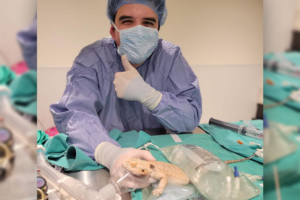
With increasing regularity, our pet parents are showing up with bearded dragons (‘beardies’), bunnies, ferrets, parrots, chameleons, cockatoos, and tortoises (to name a few) for both wellness visits and to correct health issues. Fortunately, we’re experts in dealing with most exotic pets and we’d like to pass along some information to make your relationship with your new family member as happy and healthy as possible.
For starters, they live up to their name: exotics, and every one of them are different and require that you know what you’re doing before you bring your new pet home. For example, it would be easy to think that geckos, bearded dragons, and chameleons eat very similar diets, with crickets and other insects making up the bulk of their diet. In fact, that couldn’t be further from the truth!
To get the inside scoop, we interviewed one of our newer vets who only treats exotics, Dr. Eric Los Kamp. Here’s what he had to say:
“Animal husbandry refers to providing care for animals and pets. Good husbandry of your pet is important, regardless of what animal type you’ve chosen to join your family. With exotic animals, however, each species requires special knowledge of their nutritional needs, as well environmental requirements since you want to keep them healthy to share long lives with you.”
Dr. Los Kamp’s first rule: “Know your species’ requirements.” Each species has different nutritional and environmental requirements. For instance, snakes are carnivores and need a monitored temperate environment, not too hot or too cold. Other reptiles, for example, the popular leopard gecko, needs different care since they are insectivores which need to live in relatively high temperatures.
In the world of exotic reptiles, one size definitely doesn’t fit all! A case in point is that some reptile food requirements may change with the age of your pet. Bearded dragons, for example, typically start out life eating more insects that are supplemented by plants. At some point in your beardie’s life, however, that ratio will flip to being far more plant-based with the addition of insects on a far less frequent basis. Continuing a heavy insect-based diet too long can actually cause serious health issues with your pet.
The question is: how do I know when to make that dietary change? Can I feed my beardie any type of insect? According to Dr. Los Kamp, the answer can vary with condition and age of the pet. “Get the knowledge you need to provide the best care for your pet from trusted sources, such as a vet with exotic animal expertise.” Online information is not always reliable, and sometimes it’s just wrong. Remember that not all vets have experience with exotics, so you really need to do your homework. Your pet will thank you.
And to further prove the point about exotics’ nutritional challenges, let’s continue to use our beardie as an example. Reptiles like beardies like eating many varieties of worms, grasshoppers and crickets. Just like humans, they need to eat nutritious food, and you, as the pet parent, will need to become proficient at something called ‘gut loading.’ Gut loading is the process where you feed the insects special food prior to giving them to your beardie to ensure that each is as nutritious as possible. You can’t just pick them up at a pet store and expect that they will be the quality food your pet needs.
No matter what type of exotic pet you choose, to keep them happy, healthy and with you for a long time, it’s critical that you learn:
- their complex nutritional and environmental needs along with required supplements
- that their physiology is often very different, more complicated and delicate
- the commitment you’ll be making (a parrot, for example, could easily outlive its pet parent)
- what stresses them (a BIG concern with many exotics) and how to deal with that
- if training for your exotic is a necessity vs a nice thing to do
- typical behaviors you should expect from your new pet
Your exotics vet at WPVH can answer these questions, and more as they relate to your family member. Your exotic pet could be one of the most rewarding, fun decisions you’ve ever made! Just make sure you understand your part in this fantastic new relationship.

